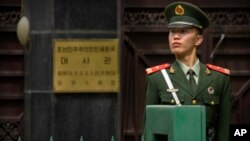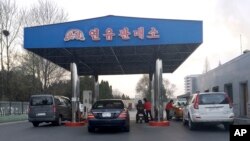U.S. President Donald Trump and many experts have said that China’s support in efforts to limit North Korea’s weapons programs is important.
The Trump administration told U.S. senators Wednesday that sanctions and diplomacy were needed to get North Korea to return to negotiations. The United Nations, the U.S. and South Korea have all placed sanctions on North Korea to force it to end its nuclear weapons program.
However, China’s willingness and ability to pressure its neighbor is not fully clear.
Additional energy cuts possible
Some observers in China say the government is doing all it can to restrain North Korea. China cut coal imports from North Korea earlier this year. It also is reducing financial flows to the North.
Lu Chao is a North Korea expert at the Liaoning Academy of Social Sciences in northeast China. Lu says Chinese banks have stopped banking activities with North Korean banks.
“China has imposed the harshest sanctions ever against North Korea, the effect of which may take some time to kick in, but they will be effective,” he said.
Recent reports have said the price of gasoline in the capital, Pyongyang, more than doubled. This has led some experts to say that China is the cause.
However, some analysts say North Korea could be saving gasoline to prepare for a future import ban. Others say that, as tensions rise, the military is getting the gasoline.
China is unlikely to place new sanctions on North Korea by itself, observers say. However, North Korea could face greater restrictions if it continues to violate U.N. resolutions. These could include gasoline import cuts or other energy products.
Cai Jian is director of the Center for Korea Studies at Fudan University in Shanghai. He told VOA that such a move would have a big effect on North Korea’s nuclear weapons development.
However, he said such moves “will also affect the livelihood of its people. So, we have to be cautious about these harsh sanctions, which should only be imposed as a last resort.”
Close allies, strained ties
China has been North Korea’s main ally for many years. They are often described as being as close as “lips and teeth.” However, relations between the two countries have been strained since leader Kim Jong Un came to power in 2011.
Talks between North and South Korea, China, Russia, Japan and the United States, known as the six-party talks, have not taken place since 2007.
Kim Jong Un has now carried out three nuclear tests and more than 20 long-range missile launches.
Unlike his father, leader Kim Jong Il, Kim Jong Un has not visited China. His uncle, Jang Song Thaek was said to have had close ties with China. He also called for opening the North’s economy. But he was executed in 2013.
China recently tried to send its diplomat for nuclear issues, Wu Dawei, to North Korea. However, that move was rejected.
China has not been satisfied with North Korea’s actions. But experts such as Daniel Pinkston say China is unlikely to place so much stress on North Korea that the government collapses.
Pinkston is with Troy University in Seoul, South Korea.
“I just don’t see the Chinese doing that,” Pinkston says. “They’ don’t believe it is in their interest and I think they are probably right.”
Communications more difficult
Recent opinion pieces in Chinese state media have warned North Korea not to carry out tests banned by U.N. Security Council sanctions.
Bong Young-shik is with the Yonsei University Institute for North Korean Studies in Seoul. He says China has warned leaders in Pyongyang not to go too far.
“That’s a very stern warning to Pyongyang, to warn Pyongyang not to engage in any outright provocations that will be perceived by the United States as North Korea has crossed the redline.”
North Korea was a major issue that Trump and Chinese President Xi Jinping discussed during their meeting in early April in Florida.
Euan Graham is an international security expert with the Lowy Institute for International Policy in Sydney, Australia.
He says it is a problem that there is no one on the North Korean side who handles relations with China as Jang Song Thaek had.
“There’s no central person like Jang Song Thaek, who for many years was the main channel,” Graham said. “So, it’s not as easy, and the Chinese, I think, have genuine frustrations.”
I’m Mario Ritter.
Bill Ide reported this story for VOA News. Mario Ritter adapted it for VOA Learning English. Ashley Thompson was the editor.
We want to hear from you. Write to us in the Comments section, and visit our Facebook page.
_______________________________________________________________
Words in This Story
Harshest –adj. the most difficult or most harmful
kick in –v. take effect, to happen
sanctions –n. actions taken against a country to cause it to obey international law, usually in the form of economic restrictions
provocations –n. actions taken to cause someone to get angry or to cause a response
redline –n. a limit
frustrations –n. the state of not being able to do something










